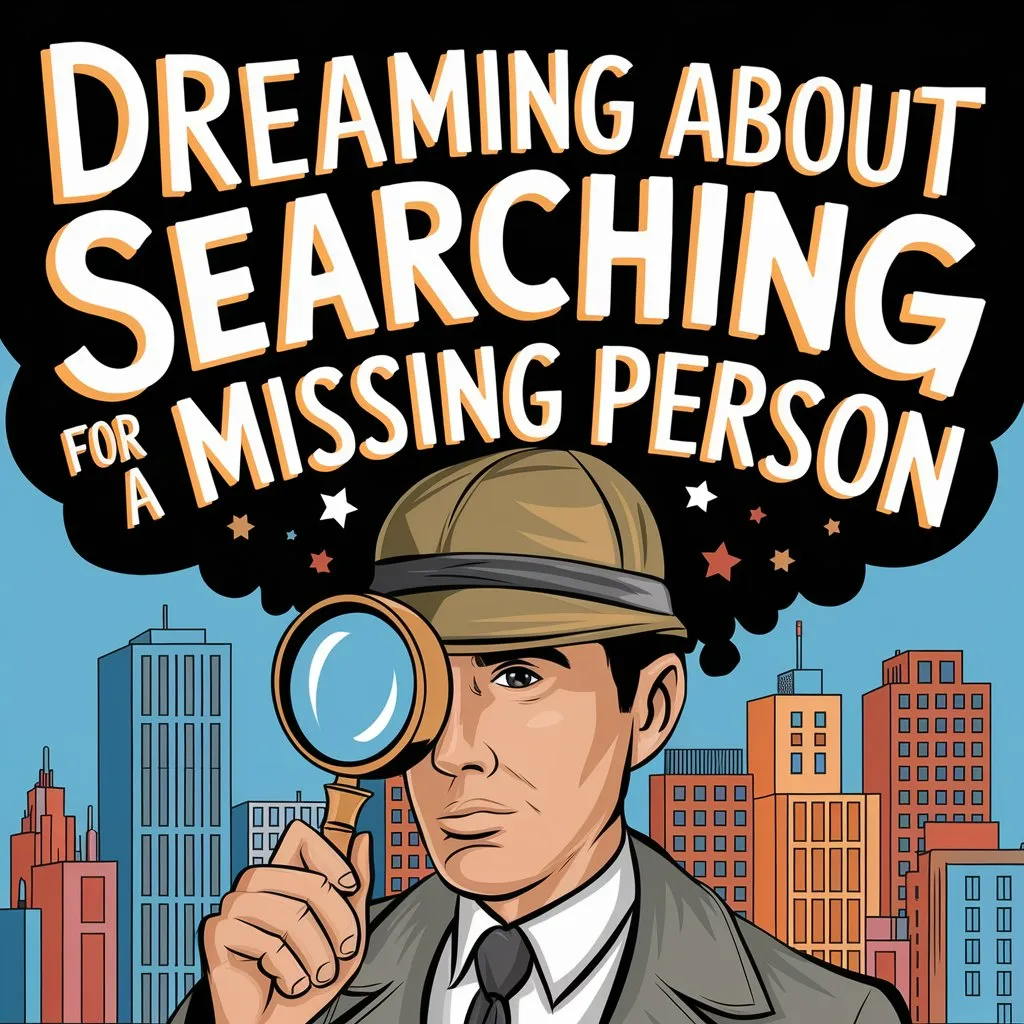Dreaming About Searching for a Missing Person: Interpretations
You’re haunted by a recurring dream where you’re desperately searching for a missing person, but can’t seem to find them. The sense of urgency and fear lingers long after you wake up. Have you ever stopped to think what your subconscious is trying to tell you?
Is it a reflection of your own fears and anxieties, or is it a hidden message from your unconscious mind? As you relive the dream, you can’t help but wonder what’s driving this emotional turmoil. What secrets are your dreams hiding, and what do they reveal about your connection to the missing person?
At a Glance
- Dreams about searching for a missing person can symbolize a quest for answers, resolution, or closure in real life.
- The subconscious mind processes emotions and memories, leading to vivid dreams and nightmares about the missing person.
- Fear, anxiety, and guilt can trigger dreams about searching, reflecting deep-seated fears and phobia roots.
- Dreams can aid in problem-solving and critical thinking, providing new ideas or insights about the missing person’s situation.
- The emotional connection to the missing person can trigger recurring themes of searching, losing, and finding in dreams.

Unraveling the Emotional Undertones
Frequently, the search for a missing person is fraught with intense emotional undertones that can profoundly impact the investigation.
As you probe into the search process, you may find yourself entangled in a web of emotional complexities. Vital to acknowledge and address the emotional baggage that comes with searching for a missing loved one.
This baggage can manifest in various ways, such as feelings of guilt, anxiety, or despair, which can cloud your judgment and hinder the investigation.
As you navigate this complex emotional landscape, you may experience inner turmoil, making it challenging to separate your emotions from the facts of the case.
Paramount to recognize when your emotions are influencing your decision-making and take steps to regulate them. This might involve seeking support from professionals, such as therapists or counselors, who can help you process your emotions and maintain a level head.
The Psychological Roots of Fear
Many individuals embroiled in the search for a missing person experience fear as a pervasive and debilitating emotion, one that can substantially impede the investigation.
You may find yourself consumed by anxiety, uncertainty, and a sense of helplessness. This fear response can be overwhelming, making it challenging to think clearly and make rational decisions.
When you’re searching for a missing person, your brain is constantly on high alert, scanning for potential threats and dangers.
This heightened state of awareness can trigger phobia roots, deep-seated fears that may have been dormant or suppressed. You may start to fear the worst-case scenario, imagining terrible outcomes, or worrying about your own safety.
As you navigate the complex emotions that arise during a search, crucial to acknowledge and understand the psychological roots of your fear.
By recognizing the underlying causes of your anxiety, you can begin to address them, developing coping strategies to manage your fear response and stay focused on the investigation.
Lost in the Subconscious Mind
As you struggle to make sense of the missing person’s disappearance, your mind becomes a maze of thoughts, emotions, and reactions.
It’s as if your subconscious landscape has become a labyrinth, with twists and turns that lead to dead ends and unanswered questions.
- Your dreams may reflect this mental turmoil, with recurring themes of searching, losing, and finding.
- You may experience vivid, unsettling images that evoke feelings of anxiety and fear.
- Your waking thoughts might be consumed by “what ifs” and “maybes,” making it difficult to focus on daily tasks.
- You might feel an overwhelming sense of responsibility, as if you’re to blame for the person’s disappearance.
- Memories of the missing person may resurface, accompanied by a deep sense of longing and sadness.
To navigate this complex mental terrain, crucially, you must engage in mindful exploration.
By acknowledging and examining your thoughts, emotions, and reactions, you can begin to untangle the web of feelings that’s holding you back.
This process of self-reflection can help you better understand your own psyche, allowing you to find a sense of balance and clarity in the midst of uncertainty.
Symbolism Behind the Search
Examining the symbolism behind your search for the missing person can reveal hidden patterns and meanings that influence your thoughts, emotions, and actions.
When you dream about searching for someone, your subconscious may be using this scenario to process feelings of loss, separation, or disconnection in your waking life.
The search itself can symbolize your quest for answers, resolution, or closure.
The search parties you assemble in your dream may represent different aspects of yourself, working together to find solutions.
Investigation techniques you employ in the dream, such as following clues or tracking leads, can signify your problem-solving strategies and coping mechanisms.
Even the environment in which you’re searching can hold symbolic meaning.
For instance, a dark forest might represent uncertainty or fear, while a well-lit cityscape could symbolize clarity and control.

Unconscious Desires and Fears
Through the lens of your search for the missing person, your unconscious desires and fears may be revealed, influencing the dynamics of your dream.
As you navigate the twists and turns of your subconscious, you may uncover hidden anxieties and unresolved emotions that are driving your actions.
- Your search may be a reflection of your deep-seated social anxiety, manifesting as a fear of being left behind or abandoned.
- It could be a symbol of self-blame, where you’re trying to make amends for a perceived mistake or shortcoming.
- Alternatively, the dream could be an expression of your desire for control and order in a chaotic world.
- Your subconscious may be processing feelings of helplessness or powerlessness, leading you to search for a solution to an unsolvable problem.
- The dream could also be a manifestation of your fear of loss or separation, highlighting your need for connection and belonging.
The Role of Guilt and Regret
Your search for the missing person may also be influenced by feelings of guilt and regret, which can manifest in various ways.
You might be replaying past mistakes in your mind, wondering if you could’ve done something differently to prevent the person’s disappearance. These “what-ifs” can fuel your search, as you try to make amends or find closure.
Guilt can also stem from unresolved conflicts or unfinished business with the missing person.
You may feel that you didn’t resolve an issue or express your feelings adequately before they vanished. This sense of regret can drive your search, as you seek to redeem yourself or find a way to make things right.
Facing the Unknown and Uncertainty
As the search for the missing person unfolds, you’re inevitably confronted with the intimidating reality of facing the unknown and uncertainty.
This formidable task can trigger a fear response, thrusting you into emotional turmoil. The uncertainty of the outcome and the lack of control can be overwhelming, leaving you feeling helpless and anxious.
- The ambiguity of the situation can lead to a sense of unease, making it difficult to focus on the task at hand.
- The uncertainty of the missing person’s fate can evoke feelings of dread and hopelessness.
- You may find yourself questioning your own abilities and judgment, leading to self-doubt and uncertainty.
- The emotional toll of the search can be exhausting, leaving you feeling drained and vulnerable.
- The fear of the unknown can be paralyzing, making it challenging to make decisions and take action.
As you navigate this emotional minefield, it’s crucial to acknowledge and accept your emotions, rather than trying to suppress or deny them.
Deciphering the Dreamer’s Message
While searching for the missing person, you may receive cryptic messages or clues from the dreamer, which can be both intriguing and perplexing.
These messages can be symbolic, metaphorical, or even literal, leaving you to decipher their meaning. To decode the dreamer’s message, try to identify recurring themes, emotions, or sensations in the dream.
Ask yourself what triggered these emotions and sensations, and how they relate to the missing person.
Your dream motivation might be driven by a desire to reconnect with the missing person or to uncover hidden truths.
As you reflect on the dream, pay attention to your inner guidance, trusting your intuition to guide you towards the underlying message.
Look for patterns, connections, or correlations between the dream elements and the missing person’s circumstances.
FAQs
Can Recurrent Dreams About Searching for Someone Indicate a Real-Life Concern?
When you’re stuck in a cycle of searching for someone in your dreams, it may signal a real-life concern about feeling lost or disconnected from your own identity, urging you to tap into your inner guidance for self-reflection and discovery.
Do Dreams About Searching for a Missing Person Always Have a Negative Meaning?
You wonder if dreams about searching for someone always signal emotional turmoil, but they can also serve as your inner guidance, nudging you to confront and resolve unresolved issues, ultimately leading to personal growth and self-awareness.
Can Dreams About Searching for a Stranger Reveal Hidden Fears or Anxieties?
When you dream about searching for a stranger, you may be unconsciously projecting your deepest fears onto this unknown figure, revealing hidden emotional baggage that’s been weighing you down, and sparking a need for self-reflection to confront and overcome these anxieties.
Are Dreams About Searching for a Missing Person More Common in Certain Age Groups?
You might wonder if certain age groups are more prone to specific types of dreams. Research suggests that age demographics play a role, with youth perspectives showing that younger adults tend to experience more anxiety-driven dreams, potentially linked to life passages.
Can Lucid Dreaming Help Resolve Unconscious Conflicts in Search Dreams?
You can utilize lucid dreaming to tap into unconscious emotions and personal symbolism, allowing you to confront and resolve deep-seated conflicts, potentially leading to a greater sense of self-awareness and emotional clarity.

I’m Eliza Trinity, a spiritual guide and writer at SoulfulSignificance.com, where my mission is to illuminate the path of spiritual fulfillment through Christ’s teachings. With a Theology degree and a counseling background, I blend biblical wisdom with real-world insight to support those on their journey to discovering their soul’s significance.




